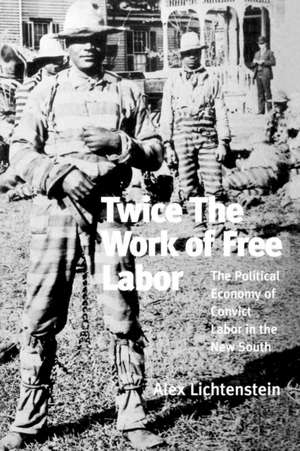Twice the Work of Free Labor: Haymarket (Paperback)
Autor Alex Lichtenstein, Alexander C. Lichtensteinen Limba Engleză Paperback – 31 dec 1995
Twice the Work of Free Labor is the first book-length study of the history of the Southern convict-lease system and its successor, the chain gang. For nearly a century after the abolition of slavery, convicts labored in the South’s mines, railroad camps, brickyards, turpentine farms and then road gangs, under abject conditions. The vast majority of these prisoners were African Americans. In this timely book, Alex Lichtenstein reveals the origins of this vicious penal slavery, explains its persistent and widespread popularity among whites, and charts its unhappy contribution to the rebirth of the South in the decades following the Civil War.
The book also offers an original analysis of the post-Civil War South’s political economy. Lichtenstein suggests that, after emancipation, forced black labor was exploited not by those who yearned for the social order of the slave South, but by the region’s most ardent advocates of progress. The convict-lease and chain gang allowed a New South to rise while preserving white supremacy.
Preț: 145.83 lei
Nou
Puncte Express: 219
Preț estimativ în valută:
27.90€ • 29.21$ • 23.23£
27.90€ • 29.21$ • 23.23£
Carte disponibilă
Livrare economică 10-24 martie
Preluare comenzi: 021 569.72.76
Specificații
ISBN-13: 9781859840863
ISBN-10: 1859840868
Pagini: 264
Dimensiuni: 152 x 229 x 20 mm
Greutate: 0.43 kg
Ediția:New.
Editura: VERSO
Seria Haymarket (Paperback)
ISBN-10: 1859840868
Pagini: 264
Dimensiuni: 152 x 229 x 20 mm
Greutate: 0.43 kg
Ediția:New.
Editura: VERSO
Seria Haymarket (Paperback)
Notă biografică
Alex Lichtenstein is Associate Professor of History at the University of Pennsylvania.
Recenzii
“Powerful, painstakingly researched, gracefully written, Twice the Work of Free Labor is a must read for anyone seeking an historical perspective on the current expansion of the US prison industry and the state’s reliance on incarceration to deal with the poor.”—Robin D.G. Kelley
































